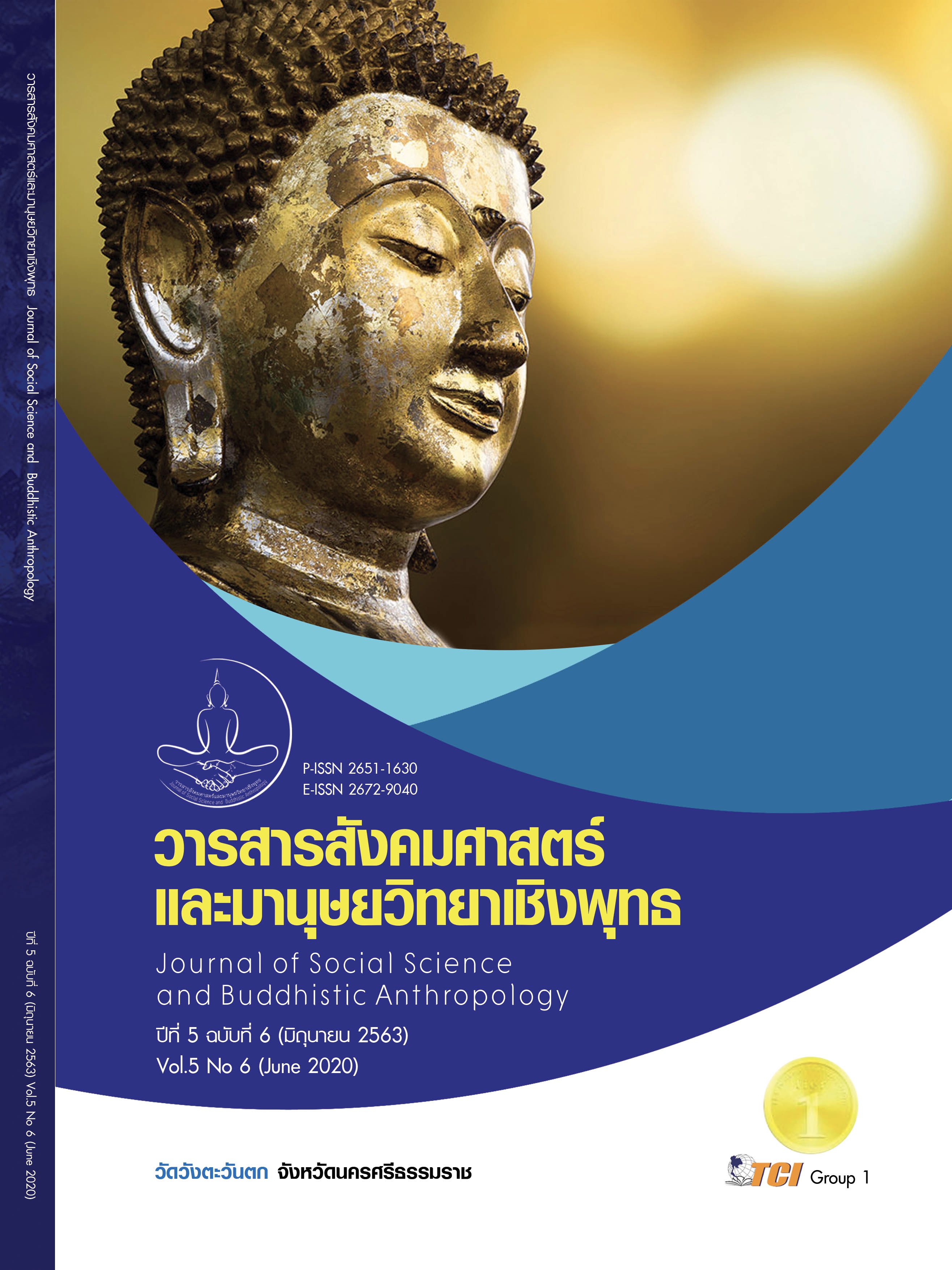A PATTERN OF INTELLIGENCE DEVELOPMENT IN FACING AND OVERCOMING OBSTACLES BASED ON BUDDHIST PSYCHOLOGY BYSTANDARD IX STUDENTS OF WAT SAI MA SCHOOL OF NONTHABURI
Keywords:
Intelligence development model, Face and overcome obstacles, Buddhist psychologyAbstract
The intelligence development model in facing and overcoming obstacles through Buddhist psychology of Standard IX students, Wat Sai Ma community school, Nonthaburi province had 3 main purposes as follows; 1) to study idea and concept of human intelligence in facing and overcoming life obstacles through Buddhist psychology 2) To construct and the intelligence development model and, 3) To test intelligence development program in facing and overcoming obstacles. The mixed-method research was used in this study. The instruments were questionnaire and Quasi Experimental Research Design with 30 students of Standard IX students, Wat Sai Ma community school, Nonthaburi. Statistics were percentage, mean, standard deviation and also content analysis. The results revealed as follows. 1) The results of using the mentioned program indicated that educating students in keeping 5 percepts, self-discipline enhancement, using intelligence in solving problems, and being patient lead to the changes in thinking and action. 2) The model was constructed by integrating 4 Buddhist right exertions or Samphanthaphan 4 with the ability to face with difficulties and all kinds of life obstacles (Adversity Quotient: AQ) which was considered to be one of western psychological theories. The model of developing intelligence in facing difficulties and overcoming all kinds of life obstacles for students was created by using five percepts as the basis and the way of living. 3) According to the statistical analysis, there was no difference between representative group and controlled group both before and after the experiment. However, there was the difference in the results of attending intelligence development program in facing and overcoming obstacles through Buddhist psychology of Standard IX students in representative group. When comparing mean in the whole image, the results confirmed that persons who joined the mentioned program were statistically significant at 0.05 level both keeping the 5 percepts, having conscience and self-discipline in solving problems, and also being patient in living. The results of using program of developing intelligence in facing and overcoming all kinds of life obstacles through Buddhist psychology were indicated that educating students to keep five percepts, enhancing students to maintain self-discipline, and teaching them to use intelligence in order to solve problems patiently lead to students’ thinking, speech, and action change.
References
นันท์นัทธฉัตร ศรีวิเศษ. (2558). การประยุกต์ใช้หลักพุทธธรรมในการปฏิบัติงานของผู้บริหารและครูใน สถานศึกษาขั้นพื้นฐาน สังกัดสำนักงานเขตพื้นที่การศึกษาประถมศึกษากาญจนบุรี เขต 2. ใน วิทยานิพนธ์ครุศาสตรมหาบัณฑิต สาขาวิชาการบริหารการศึกษา. มหาวิทยาลัยราชภัฏกาญจนบุรี.
พระธรรมปิฎก (ป.อ.ปยุตฺโต). (2530). การพัฒนาตน. กรุงเทพมหานคร: อัมรินทร์ พริ้นติ้น กรุ๊ป.
พระพรหมคุณาภรณ์ (ป.อ. ปยุตฺโต). (2548). พจนานุกรมพุทธศาสตร์ ฉบับประมวลธรรม. กรุงเทพมหานคร: บริษัท เอส. อาร์. พริ้นติ้ง แมส โปรดักส์.
มหาจุฬาลงกรณราชวิทยาลัย. (2539). พระไตรปิฎกฉบับภาษาไทย ฉบับมหาจุฬาลงกรณราชวิทยาลัย. กรุงเทพมหานคร: โรงพิมพ์มหาจุฬาลงกรณราชวิทยาลัย.
ลัดดาวัลย์ เกษมเนตร และประทีป จินงี่. (2546). การอบรมเลี้ยงดู: รูปแบบและผลที่เกิดกับ ลูกรัก. กรุงเทพมหานคร: ร่วมสรรค์สร้างเด็กและเยาวชน พริ้นต์.
สมเด็จพุทธโฆษาจารย์ (ป.อ. ปยุตโต). (2550). วินัย เรื่องใหญ่กว่าที่คิด. กรุงเทพมหานคร: พิมพ์สวย.
Stoltz, P.G. et al. (1999). Adversity Quotient: Turning obstacles into opportunities. New York: Bantan Books.
Yamane T. (1973). Statistics: An Introductory Analysis. New York: Harper and Row Publications.









